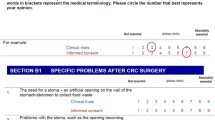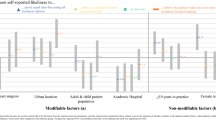Abstract
Introduction
The Society of Surgical Oncology (SSO) created a task force to address the issue of surgical outcomes as it pertains to clinical practice. A survey of its members was conducted to determine which domains of “outcomes” are important and relevant to surgical oncologists.
Methods
Participation of 1,929 SSO members was solicited via e-mail; 1,881 messages were successfully delivered. The survey instrument was administered via a web-based portal. The questionnaire was comprised of three parts: demographic information; rating scales to assess interest, involvement, and knowledge in the various domains of surgical outcomes; and questions to elicit preferences and opinions on current topics in the field of surgical outcomes.
Results
There was an overall response rate of 30% (570 of 1,881). Respondents were representative of the general membership with respect to demographics acquired in self-reported profiles. Most members valued the clinical application of evidence-based medicine, adoption of new technologies, and quality monitoring of cancer care as particularly important areas in outcomes research. SSO members also rated quality improvement measures as important. However, there is uncertainty whether current efforts to enforce quality indicators by third party payers or with public accountability would be helpful.
Conclusion
Overall, this survey successfully delineated beliefs and views of the SSO members with regard to areas of particular interest in surgical outcomes, including improving the quality of cancer care. These findings have implications for planning future agendas for outcomes and health service research and in guiding national policy efforts on behalf of all SSO members.





Similar content being viewed by others
References
National Cancer Policy Board, Institute of Medicine and Commission on Life Sciences, National Research Council. Hewitt M, Simone JV (eds). Ensuring quality cancer care. National Academy Press, Washington, DC, 1999
Kuerer HM, Eberlein TJ, Pollock RE et al. Career satisfaction, practice patterns and burnout among surgical oncologists: report on the quality of life of members of the Society of Surgical Oncology. Ann Surg Oncol 2007; 14:3043–53
American Society of Clinical Oncology, Quality Care and Guideline. http://www.asco.org/ASCO/Quality+Care+%26+Guidelines. Accessibility verified March 1, 2008
National Comprehensive Cancer Network. NCCN Clinical Practice Guidelines in Oncology. http://www.nccn.org/professionals/physician_gls/default.asp. Accessibility verified March 1, 2008
Bennett CL, Somerfield MR, Pfister DG et al. Perspectives on the value of American Society of Clinical Oncology clinical guidelines as reported by oncologists and health maintenance organizations. J Clin Oncol 2003; 21:937–41
Callcut RA, Breslin TM. Shaping the future of surgery: the role of private regulation in determining quality standards. Ann Surg 2006; 243:304–12
National Quality Forum. Specifications of the national voluntary consensus standards for breast and colon cancer. http://www.qualityforum.org/pdf/cancer/txbreast-colonAppA-Specsvoting01-18-07clean.pdf Accessibility verified October 9, 2007
Ferris TG, Vogeli C, Marder J et al. Physician specialty societies and the development of physician performance measures. Health Affairs 2007; 26:1712–9
Begg CB, Cramer LD, Hoskins WJ et al. Impact of hospital volume on operative mortality for major cancer surgery. JAMA 1998; 280:1747–51
Birkmeyer JD, Siewers AE, Finlayson EV et al. Hospital volume and surgical mortality in the United States. N Engl J Med 2002; 346:1128–37
Birkmeyer JD, Stukel TA, Siewers AE et al. Surgeon volume and operative mortality in the United States. N Engl J Med 2003; 349:2117–27
Birkmeyer JD, Sun Y, Wong SL et al. Hospital volume and late survival after cancer surgery. Ann Surg 2007; 245:777–83
Fong Y, Gonen M, Rubin D et al. Long-term survival is superior after resection for cancer in high-volume centers. Ann Surg 2005; 242:540–4
Johnson FE, Sakata K, Kraybill WG et al. Long-term management of patients after potentially curative treatment of extremity soft tissue sarcoma: practice patterns of members of the Society of Surgical Oncology. Surg Oncol 2005; 14:33–40
McCahill LE, Krouse R, Chu D et al. Indications and use of palliative surgery-results of Society of Surgical Oncology survey. Ann Surg Oncol 2002; 9:104–12
Acknowledgement
The authors thank Rick Slawny for administrative assistance with the survey.
Author information
Authors and Affiliations
Corresponding author
Rights and permissions
About this article
Cite this article
Wong, S.L., McCahill, L.E., Edge, S.B. et al. Getting to Better Cancer Care: Results of a Society of Surgical Oncology Survey. Ann Surg Oncol 15, 2363–2371 (2008). https://doi.org/10.1245/s10434-008-9946-6
Received:
Revised:
Accepted:
Published:
Issue Date:
DOI: https://doi.org/10.1245/s10434-008-9946-6




